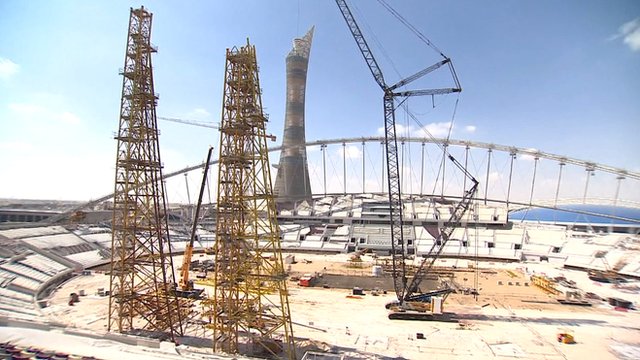Construction on the largest stadium being built for Qatar’s 2022 World Cup is due to begin this year. British architectural firm Foster and Partners designed the stadium, which will hold 80,000 people. Five World Cup stadiums are currently under construction. The situation of migrant laborers who work on these stadiums has recently garnered more media attention. Amnesty International recently released a report detailing widespread migrant worker abuse, including frequent passport confiscation and delays in receiving wages. These abuses are prohibited under Qatari law.
Qatar’s migrant workers, who make up more than 90% of its population, are in great need of protective legislation. Harsh and demeaning working conditions tend to be the norm; male construction workers labor in 100 degrees Farenheit conditions, and female domestic workers are especially vulnerable to abuse in private homes. The Kafala system requires workers to have a sponsor. Many employers confiscate workers’ passports, inhibiting their ability to obtain an exit visa that allows them to leave the country. The need for migrant worker protection is particularly significant in the wake of the 2022 World Cup, when so many have traveled to Qatar to try to earn remittances. Over 1,200 workers have died so far during the construction of the stadiums due to abuse. In response to criticism, the Qatari government previously promised to make substantial reforms three years ago. It hired a law firm, DLA Piper, to review the issue. These reforms were to include an overhauling of the Kafala system, changes in the exit permit process for workers, and a payment system through which workers would receive wages electronically.
However, the government has failed to implement the reform it promised. For example, one group of construction workers was trapped after their employer confiscated their passports and withheld their pay for more than four months. Difficult work conditions and mistreatment from employers remain the norm. Such incidents greatly undermine the World Cup’s Supreme Committee’s recent statement of its commitment to the welfare of “every worker” at the stadiums.
In accordance with international standards of labor conditions and human rights, Qatar must improve the living and working conditions of its migrant workers. The country must follow through on its promises concerning the World Cup, and on improvements to the general status of migrant workers. If Qatar does not cooperate and change, migrant workers will continue to suffer.
Margaret Bailey is an Advocacy Intern at ADHRB.





